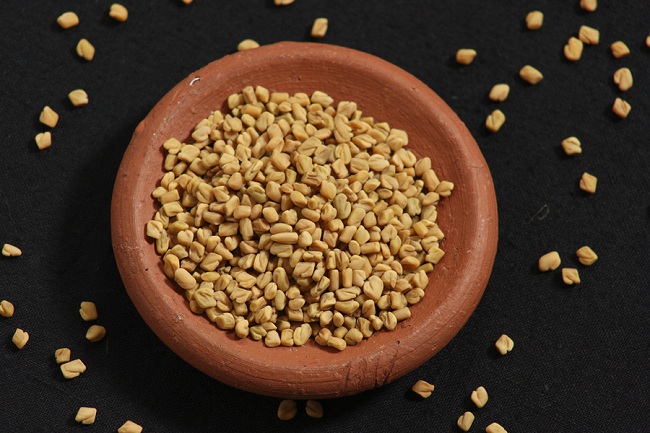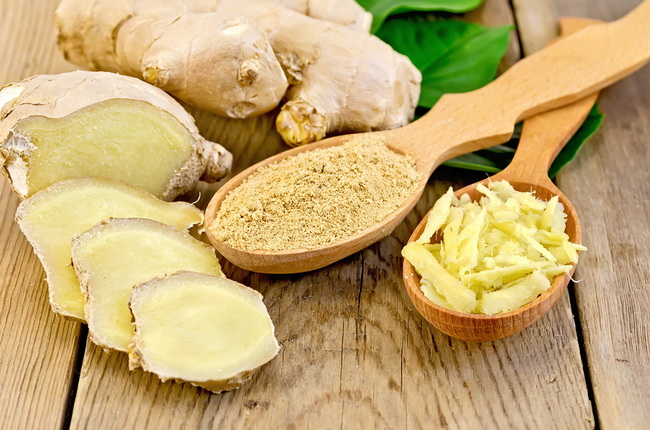- Make It Yourself Lavender Heart-Shaped Bath Bombs!
- 20 Things You Never Knew About “Down There”
- 12 Best Foods For Those Suffering From Arthritis Pain
- 12 Personal Hygiene Mistakes Almost Everyone Makes (Mom Never Told You About #4!)
- 15 Medicinal Plants And Herbs From The Cherokee People
- 12 Mind-Blowing Benefits Of Drinking Coconut Water During Pregnancy
- 12 Outstanding Winter Foods That Won’t Fatten You Up Like A Christmas Turkey
15 of the Best Herbs and Spices for a Healthy Heart (#10 is Little Weird)

Photo credit: bigstock.com
When we think about the heart, we might picture love or those little emoticons we send on Facebook, but the heart is actually a powerful muscle responsible for pumping blood through our little networks of arteries and veins. The blood provides the body with oxygen and nutrients, as well as helping remove waste from the body.
Heart disease is the leading cause of death in America. More than 611,000 people die from heart disease every year, according to the Centers for Disease Control and Prevention. There are several different types of heart disease, and your risk can increase with certain factors such as a sedentary lifestyle, family history, smoking, high cholesterol, high blood pressure, obesity, diabetes, and excessive alcohol use.
Common symptoms that might indicate a heart problem include chest discomfort or pain, fatigue, rapid or irregular pulse, persistent coughing, anxiety attacks, and shortness of breath.
You can do without a lot of things, but your heart isn’t one of them. Since it functions 24 x 7 x 365, you should do what you can to keep it healthy. One of those ways is to eat a healthy diet. You can also add plenty of heart healthy herbs and spices in your cooking to improve your overall heart health even more.
Keep reading and find the top 15 herbs and spices you should be adding to your diet to keep the old ticker going strong.
1. Cardamom
Cardamom is well-known for helping with stomach problems such as indigestion, upset stomach, heartburn, and more. But it also can lower blood pressure, which is good for the heart. Cardamom has powerful antioxidant compounds which help to fight the damage free radicals can cause to the heart and other tissues in the body.
2. Thyme
You might not think that by adding a bit of thyme to your dishes you are making much of difference in your life, but the truth is that adding some thyme to food can add time to your life. Thyme carries an impressive array of antioxidant power, which fights the damage free radicals can cause to the entire cardiovascular system. Thyme also has powerful antimicrobial compounds that can help to keep the body free from harmful fungi and other types of dangerous bacteria.
3. Garlic
Garlic is the king of heart-healthy herbs. This highly beneficial herb has been proven in literally hundreds of studies to have anti-inflammatory, antiplatelet, and antithrombotic compounds. In 2006, The American Society for Nutrition published study showing a powerful link between the consumption of garlic and benefits to the heart. Garlic can lower bad cholesterol (LDL) levels, lower hypertension levels, and increase platelet aggregation. Crush and eat one or two fresh cloves of garlic each day for best results, or ask your doctor for the proper dosage of garlic supplements you should take for your condition. If you take any type of prescription medications, always speak to your doctor before consuming garlic, as it can cause serious interactions.
Continue to Page 2

Photo credit: bigstock.com
4. Hawthorn
Hawthorn is another herb that is well-known for its heart-healthy benefits. Hawthorn dilates the blood vessels, which lowers blood pressure levels. It also improves cardiac muscle contractions, lessening palpitations and giving you an overall stronger heartbeat. It increases blood flow to the heart and its anti-arrhythmic effect steadies the heartbeat. Researchers doing a review of clinical trials in the 2010 Pharmacology Review found that hawthorn was a safe, nontoxic, and very effective herb for the treatment of ischemic heart disease and cardiovascular disease. Hawthorn might react with other medications, so speak to your doctor first about whether or not hawthorn is right for you and what the best dosage would be for your situation.
5. Cayenne
The active ingredient in cayenne is capsaicin, which is a powerful antioxidant with the potential to fight oxidation, prevent blood clots, and dilate blood vessels, which lowers blood pressure. All of these things are important for a healthy heart. Cayenne can also increase the metabolism and help with weight loss. You can take capsaicin supplements of between 2,000 and 4,000 IUs every other day. You should always consult your doctor first. Cayenne should never be taken in excess as it can cause complications.
6. Cinnamon
This common spice has a lot to offer those who are looking for protection from heart disease. Cinnamon can inhibit the release of the fatty acids that cause inflammation of platelet membranes in the blood. This can help to keep the blood at a proper thickness, which can lower blood pressure. Cinnamon also helps to lower the bad (LDL) cholesterol and triglycerides in the blood as well, making it super heart healthy! Who doesn’t love the taste of cinnamon, right? Drink cinnamon tea, spread some in your oatmeal, and add half a teaspoon to your morning coffee. If you are taking prescription blood thinners, talk to your doctor first.
Continue to Page 3

Photo credit: bigstock.com
7. Fenugreek Seeds
This herb isn’t as popular or as common as some of the other herbs here, but fenugreek has powerful cardio-protective benefits due to its high level of antioxidants. There are numerous compounds in fenugreek that help clear up clogged arteries, lower blood pressure, reduce cholesterol, and prevent heart attacks. It also helps to prevent obesity by stabilizing blood sugar levels, two major contributors to heart disease. To use these seeds, soak one teaspoon of fenugreek seeds in one cup of water overnight. In the morning, strain out the seeds and eat them on an empty stomach. Do this every day for best results.
8. Rosemary
This wonderfully scented spice is a huge boon to the immune system and the brain. Your immune system can help keep your heart healthy by fighting short term dangers, like the flu or a cold, and long term risks like heart disease. Rosemary improves the circulation, which is also good for the heart. Improved circulation helps every single organ in the body, including the brain. So add rosemary to your cooking or try some rosemary tea.
9. Coriander
Sometimes coriander is called cilantro, but no matter what you call it, coriander seeds and leaves are great for the heart since they contains natural antioxidants and antiplatelet compounds. This can help reduce platelet aggregation, which impairs blood flow to the heart. Coriander seeds can reduce LDL cholesterol, as well as triglycerides. The Journal of Environmental Biology published a 2008 study proving that coriander seeds were very beneficial to blood cholesterol levels. Coriander can also help manage diabetes, which is a major risk factor in heart disease.
Continue to Page 4

Photo credit: bigstock.com
10. Ginger
The spice most people think of for nausea is also a natural anti-inflammatory with blood-thinning compounds that can lower bad cholesterol (LDL). Ginger contains an active compound called gingerol, which stimulates blood flow and relaxes the blood vessels, lowering blood pressure. The Journal of Nutrition published a study in 2000 where researchers discovered that regular consumption of ginger extract reduced cholesterol levels, inhibited the development of atherosclerosis, and slowed LDL oxidation. Drink two or three cups of ginger tea throughout the day or add fresh, organic ginger root to your cooking.
11. Green Tea
There are so many benefits when it comes to green tea that it would be hard to list them all! However, as far as your heart is concerned, green tea is loaded with healthy antioxidants and flavonoids. Green tea improves the health of the lining of your heart and blood vessels while reducing triglyceride and cholesterol levels. The European Journal of Cardiovascular Prevention and Rehabilitation published a study in 2008 showing that regular intake of green tea can improve the function of blood vessels. In fact, studies show that you can lower the risk of dying from a heart attack or stroke by as much as 26 percent by drinking five cups of green tea each day.
12. Hibiscus
Many followers of traditional medicine believe that hibiscus can reverse heart disease. The water extracts from the flowers of this plant do affect the hardening of the arteries, lower blood sugar levels, and lower blood pressure. In 2003, The Journal of Agricultural and Food Chemistry published a study which showed that hibiscus extract inhibited the development of atherosclerosis in rabbits that were fed a high-cholesterol diet. Drink two cups of hibiscus tea twice each day for best results.
Continue to Page 5

Photo credit: bigstock.com
13. Turmeric
The active ingredient in turmeric is curcumin, which has potent anti-inflammatory and antioxidant compounds. Curcumin can improve cardiovascular health by increasing blood circulation and preventing blood clots. By controlling inflammation, curcumin can stop one of the main drivers of heart disease. It also prevents hardening of the arteries by lowering cholesterol levels and inhibiting fat oxidation.
14. Basil
You might think basil is only good for Italian food, but basil is loaded with healthy antioxidants, and it repairs your DNA, both of which are good news for your heart. Basil is also an antibacterial herb, which means it kills harmful bacteria while allowing the good bacteria in your body to thrive. Consider increasing your basil consumption by growing some of your own at home! This herb is super easy to grow, and what could taste better than fresh herbs picked from your own garden?
SEE ALSO: A Heart Disease Risk You Never Imagined Could Happen to You
15. Cumin
You probably have some ground cumin in your spice rack right now, so check it out and put it closer to the front! Cumin can help you avoid diabetes, which is a main factor in heart disease. It improves digestion, and gives your body some much needed nutrients. Diabetics in particular should become very familiar with this spice because it can help to normalize blood sugar levels. Cumin contains important minerals such as thiamine, phosphorus, and potassium — all of which are important for optimal heart function.
Herbs and spice are often given the short shrift when it comes to healthy eating, but the herbs and spices listed above deserve a special place in your diet for the important nutrients and antioxidants that they provide your most important muscle: the heart. They may be small in size, but they pack so much into such a small package that herbs might be behind the saying, “Good things come in small packages.”
References:




























